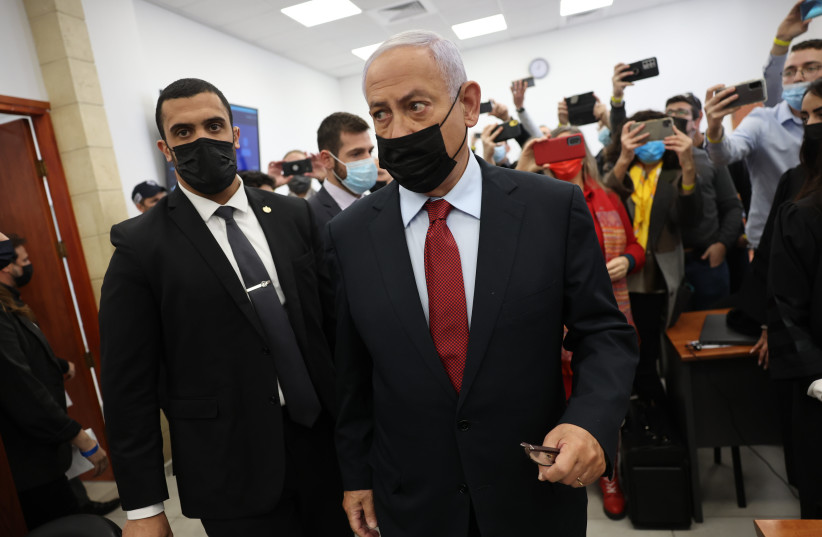In an explosive development that could change the entire character of the trial against former prime minister Benjamin Netanyahu, the Jerusalem District Court on Tuesday authorized the prosecution to cross examine his former aide turned state’s witness Shlomo Filber as if he is a hostile witness, without formally declaring him as such.
The court’s decision on Tuesday essentially gave the prosecution what it needed: stronger legal tools for cornering Filber into sticking to their narrative, but still keeping him a step away from the prosecution threatening him with jail time.
The prosecution can later decide to try to indict Filber and send him to jail, if they think he is continuing to fail to cooperate.
State Prosecutor Yehudit Tirosh had requested that the court formally declare Filber a hostile witness, saying that Filber had not cooperated sufficiently with his plea deal. If the court had granted the request completely, Filber could have lost his immunity from jail.

Asking to declare Filber a hostile witness tells the court that the prosecution believes he is lying in answers he gave that appeared to cover for Netanyahu.
Tuesday’s development beyond the first two days of hearings with Filber, when there was a tug-of-war between him and Tirosh, but the prosecution tried to lightly hint to the court that Filber’s statements to police were his truest account.
The specific issue that finally led Tirosh to lose her patience with Filber was when he tried to act like he did little wrong with his back-channeling with Bezeq officials behind the back of his own Communications Ministry officials, in order to help them with the Bezeq-Yes merger and other issues.
When Tirosh confronted Filber with his repeated admission to the police that his back channel with Bezeq was “not proper,” he still tried to awkwardly explain how he only meant that it was vaguely unethical, but not criminal.
At a certain point, Tirosh even brought Judge Rivkah Friedman-Feldman openly to her side, showing frustration with Filber not taking a clear stand on what he really meant and whether he thought the back channel was criminal.
Shortly after Tirosh saw Friedman-Feldman’s frustration, she asked to declare Filber a hostile witness.
An audible gasp hit the courtroom as the defense lawyers jumped up to object, calling the suggested move “dangerous” in terms of overly coercing Filber’s testimony. The judges called for a recess for all sides to weigh their next action carefully.
During the recess, Filber moved over to Tirosh quickly, seemingly pleading with her to back off and explain himself.
With fury in her eyes, Tirosh waved him off, seemingly to imply she was sick of his straddling the fence.
It is also possible that Tirosh was holding the immunity deal over Filber to try to get him to cooperate more going forward, and that trying to declare him a hostile witness was a final warning.
After Tirosh lost patience with him, Filber even asked the judges if he could withdraw the answers he had given that had angered her.
Filber has already testified that he had extensive back channeling with Bezeq officials behind the back of his own ministry in 2015, and somewhat in 2016.
On Tuesday, Tirosh asked Filber why he withheld from then-deputy attorney-general Dina Zilber that he had this back channel with Bezeq at a point when she was probing if he and Netanyahu were violating conflict-of-interest principles.
Zilber did not yet know anywhere near the extent of the Netanyahu relationship with Bezeq and Walla owner Shaul Elovitch; but she knew enough about their friendship to probe whether Netanyahu needed to step down as communications minister, which he eventually was forced to do.
For Filber to mislead Zilber and withhold information from her about his back channel with Bezeq could be seen as criminal, and part of a Netanyahu-Filber scheme to conceal the media bribery scheme.
However, once Filber repeatedly tried to avoid calling his withholding from Zilber a criminal act before the court, Tirosh decided that his responses, along with other answers he was giving in court contradicting his testimony to police, had gone too far.
Ultimately, it seemed the court decided not to declare Filber a hostile witness when the defense lawyers agreed that the prosecution could question him using cross-examination techniques, as if he was a hostile witness.
This move was not ideal for the defense, but they made it clear to the court that it was preferable over the prosecution and the court going all out in declaring Filber a hostile witness.
The defense explained they wanted to attack Filber as a hostile witness against Netanyahu and Elovitch, and do not want the prosecution to be able to cloud their attacks.
Following the confrontation, Filber was more cooperative with the direction that Tirosh wanted him to go, though he still gave some answers that made her uncomfortable.
Also on Tuesday, Filber noted a number of important events and turning points. He testified about a late-night meeting with Netanyahu and a mystery person who was never identified, in which Filber gave a survey of the Israeli communications market.
Moreover, he testified about an infamous “wine and cheese” meeting he had with Elovitch when they reached deals on many issues concerning Bezeq.
Filber also testified that even when Tzachi Hanegbi took over as communications minister from Netanyahu, he still handled Bezeq issues under the cloud of Netanyahu’s orders.
He said he did not feel free to act independently until May 2017, when Ayoub Kara replaced Hanegbi.
